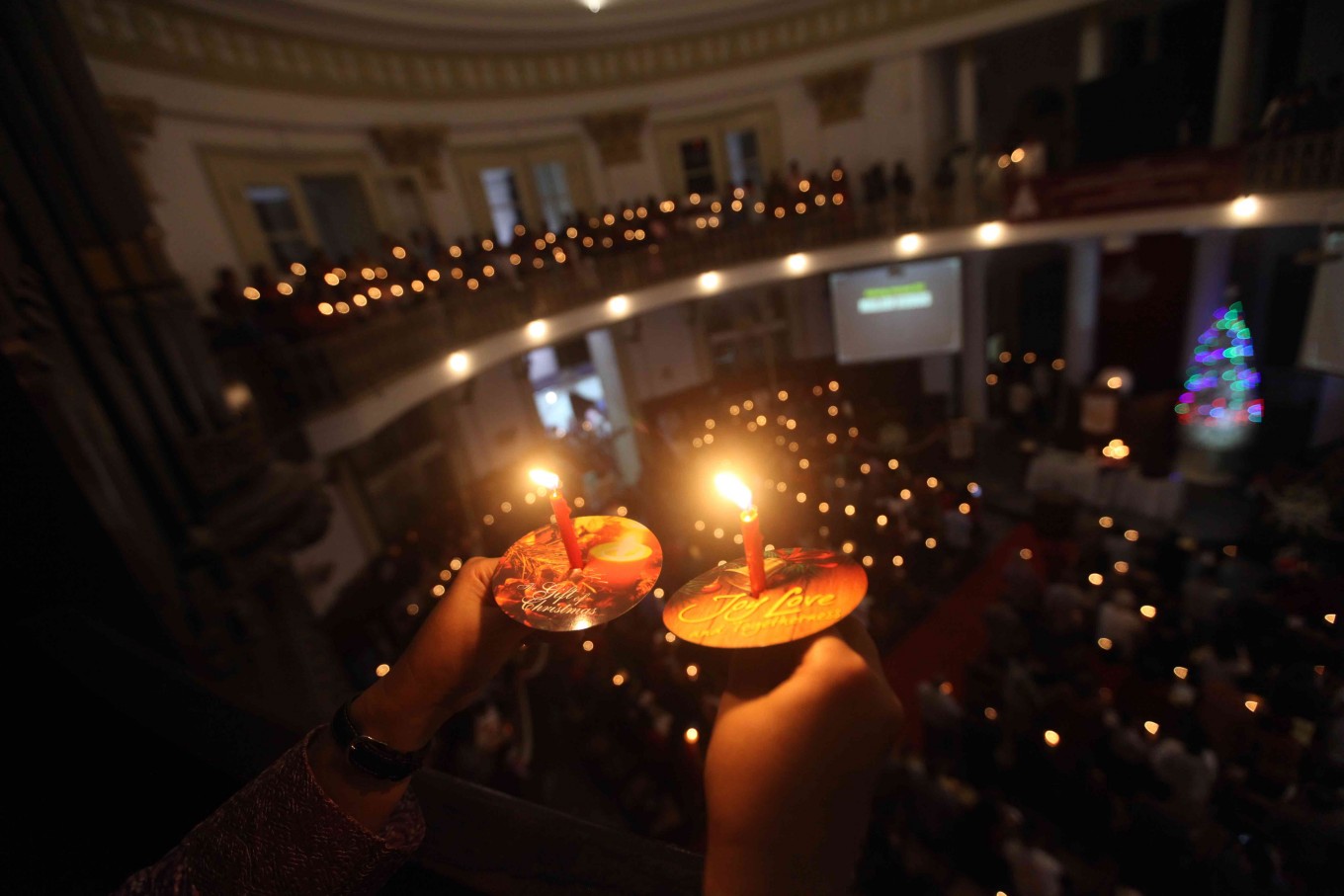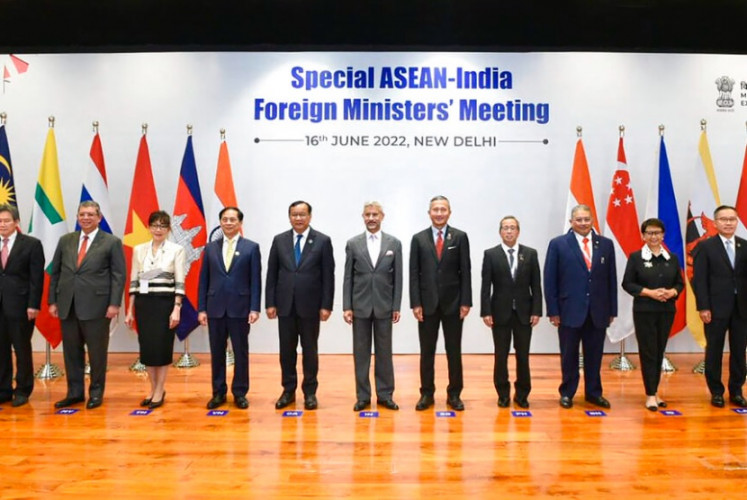The Pope is waging war against Christmas—let’s join him!
Is the pope Catholic? Well, he is the leader of the Catholic Church, so yes, he is. Duh.
Then why is he waging war against Christmas? Will he gang up with the notorious Islam Defenders Front (FPI) in Indonesia which is also waging war against Christmas?
Change Size
 By candlelight: Churchgoers raise Christmas candles during a service at Immanuel Church in Central Jakarta on Saturday. (JP/Donny Fernando)
By candlelight: Churchgoers raise Christmas candles during a service at Immanuel Church in Central Jakarta on Saturday. (JP/Donny Fernando)
Is the pope Catholic? Well, he is the leader of the Catholic Church, so yes, he is. Duh.
Then why is he waging war against Christmas? Will he gang up with the notorious Islam Defenders Front (FPI) in Indonesia which is also waging war against Christmas?
The FPI are famous for conducting “sweeping” (raids). Recently, they attempted to sweep malls in cities in Java, to prevent mall employees from wearing Christmas paraphernalia, the most common being Santa hats.
That’s amusing as the famous red and white Santa outfit is actually a commercial attribute, not a religious one. The fat, jolly, white-bearded Santa Claus figure ubiquitous when approaching Christmas day in modern times was adopted and developed by Coca-Cola to match their company colors and market their fizzy drink (see “Politics of Muslim identity over Santa outfits”, The Jakarta Post, Dec. 20). The Pope’s war against Christmas however, is about returning Christmas to its true essence. The holy feast has been “kidnapped” by worldliness, Francis says, and needs to be “liberated” from the bourgeois, materialistic charade it has become.
“The lights of shop windows push the light of God into the shadows… [People] enthused about gifts, but indifferent to our neighbors in need.”
Pope Francis points out that many people suffer because of the economic ambitions of a few, “because of sheer greed and idolatry, which leads to slavery”.
If Francis sounds like a leftie, it is not really surprising because his boss, Jesus, was a socialist too. In Matthew 6:24 Jesus says “No one can serve two masters. Either you will hate the one and love the other, or you will be devoted to the one and despise the other. You cannot serve both God and money.”
Perhaps Donald Trump missed Matthew 6:24 when he read the Bible (if he read it at all, that is) because he thinks that Christianity starts in the marketplace. One of his campaign promises: “I get elected president, we’re going to be saying ‘Merry Christmas’ [at department stores] again.” Ah Trump, the department store messiah whose god is clearly mammon. So in the eyes of Jesus, Trump cannot really be a Christian, despite his claims.
In the United States, the custom has been to wish customers “Happy Holidays” rather than “Merry Christmas” during the Christmas and New Years season, out of respect for people of other faiths. It’s political correctness, which Trump hates.
Instead of political correctness, in Indonesia we have what you might call “religious correctness”. Up to now there is still the debate as to whether it’s haram or not for Muslims to wish Christians “Merry Christmas”. In spite of the fact that the Indonesian Ulema Council (MUI) issued a fatwa forbidding Muslims to wear Christmas paraphernalia, on the issue of Muslims wishing Christians “Merry Christmas”, MUI allowed it.
Despite the MUI fatwa, at a recent event to commemorate Indonesia’s fourth president Abdurachman “Gus Dur” Wahid, Alim, a participant, stole the show by wearing a Santa hat! Don’t you just love that? Clearly religious tolerance trumps (sic!) religious correctness for Alim!
So how do Indonesians celebrate Christmas? Much like Idul Fitri, it’s very commercialized. But behind this public display of religious commodification, there are people who subscribe to Pope Francis’ injunction to humility, “smallness” and to serve the unfortunate and marginalized.
Take my friend Maria for example. She’s always very busy around Christmas as she’s involved in various social activities to visit and give donations to members of the church who are ill, the elderly, and those who are in prison; organizing Christmas celebrations for youth as well as the adult church community. On Christmas day itself, she attends church service, and only then does she go home to celebrate with the family.
Like Islam in Indonesia, Christianity is also syncretic, combining many local and Christian customs. The Javanese for example combine their Christian beliefs with kejawen (Javanese spiritualism), and their Christmas tree is not a fir tree, but made out of paper, wooden decorations and recycled material. How environmentally conscious!
In Bali, their Christmas trees are made from chicken feature. I wonder if they turn it into a feather duster after Christmas ends?
The Torajans of South Sulawesi do not just sing Indonesian language Christmas carols but also their local ethnic songs, and wear traditional costumes.
Manado, North Sulawesi, is sometimes called the Christian capital of Indonesia because they purportedly having the highest number of Christians in the country. They also claim to have the biggest Christmas tree in Asia, located at the Mega Mas Boulevard. Funded by donations, it’s meant to be a symbol of religious brotherhood.
In Papua, after Christmas mass, the Papuans light up the barapen (grilling stone) for the ritual cooking of pork. The barapen is a hole in the ground where hot stones are placed, then a layer of meat, sweet potatoes, cassava, fern, spinach and papaya,
then another layer of stone and so forth until they have three layers. The barapen tradition is an expression of togetherness, gratitude, sharing and love.
Between 1999 and 2002, the Maluku islands suffered a period of ugly sectarian conflict in which the aftermath took a while to resolve. Fortunately now peace has been restored. The celebration of Christmas includes a ceremony called cuci negeri (cleaning the nation), which symbolizes a purification and liberation of the people and environment from sin. I reckon the whole of Indonesia should engage in cuci negeri!
So in many parts of Indonesia, Christmas is totally devoid of commercialism. It all sounds pretty ideal, doesn’t it?
While Christmas is a time for joy, peace and sharing, it’s also a time when Christians in Indonesia start to get anxious. The recent FPI sweeping of Christmas attributes is mild compared to the Christmas Eve bombing in eight cities in 2000, which resulted in casualties and fatalities. Unfortunately, Muslim extremists do not necessarily wait for Christmas to persecute Christians. Just google “discrimination against Christians in modern Indonesia”, your heart will ache to read the stories.
I reckon we — Christians and Muslims alike — should heed the war cry of Pope Francis, to fight not just against the commercialization of Christmas, but also against bigotry, ignorance, arrogance, greed, and aim for tolerance, humility, compassion, sharing and love for our fellow sisters and brothers, of whatever faith. Maybe start by just a simple act of wearing the Santa hat as Alim did. If the intention is to wear it as an expression of tolerance, then it’s a good thing, no?
---------------
We are looking for information, opinions, and in-depth analysis from experts or scholars in a variety of fields. We choose articles based on facts or opinions about general news, as well as quality analysis and commentary about Indonesia or international events. Send your piece to community@jakpost.com. For more information click here.








